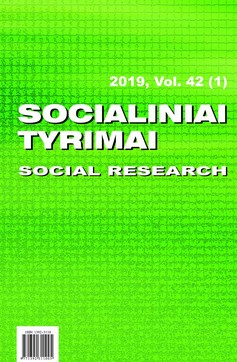Socialiai įtraukios bibliotekos samprata besikeičiančioje visuomenėje
The Concept of Socially Inclusive Library in Changing Society
Author(s): Kristina KulikauskienėSubject(s): Library operations and management, Management and complex organizations
Published by: Vilniaus Universiteto Leidykla
Keywords: inclusive organization; changing library roles; satisfaction of society needs;
Summary/Abstract: In today’s world, organizations face constant and various changes, such as new technologies, new markets, changing legal and regulatory frameworks, internal organizational changes, and changes in customer’s needs (Butt, Nawab, Zahid 2018). As public sector organizations, public libraries also face changes and the need for change. Modern society expects libraries to have access to information, to offer cultural and lifelong learning activities, and to contribute in reducing informational, digital and social exclusion. In order to meet the changing needs of society, public libraries are expanding their roles from book supply places to community centers, offering lifelong learning activities, free access to information resources, cultural and information events as well as leisure and spaces for social interaction. Therefore, defining the concept of an inclusive library can, on the one hand, broaden the concept of an inclusive organization and, on the other hand, contribute to improving the quality of library services in order to reduce social exclusion in communities and society in general. Applying the analytical content analysis of theoretical sources and scientific literature on the main features of an inclusive organization, the article aims to define the essential features of a socially inclusive library as a public organization and to analyse the concept of an inclusive library. One of the main goals of organizational change today is to achieve social responsibility and maximize sustainability. Social responsibility in organizations means meeting the needs of stakeholders and the sustainable development of the organization (Mory et al. 2016). In the context of social responsibility, the concept of organizational inclusion emerges. An inclusive organization is a modern organization. Such organization is based on its internal resources and must constantly increase its potential, improve all activities, develop plans to achieve these activities, in other words, it must evolve and be a constantly developing organization (Zakarevicius, 2012). The analysis of the scientific literature suggests, that the definition of inclusive organization in the context of public organizations is widening – from focusing on employee inclusion to a concern for the well-being of all society in general, especially for those, experiencing social exclusion. Today, being public sector organizations, libraries are in the state of constant change. Libraries are influenced by innovations which require changes in their activities (Carrillo, Gregory, 2019). At the same time, society’s expectations for libraries are changing – libraries are becoming community centers, creating and sharing knowledge, and at the same time carrying out traditional bookkeeping and publishing activities (Irwin, Silk, 2019).
Journal: Socialiniai tyrimai
- Issue Year: 42/2019
- Issue No: 1
- Page Range: 67-78
- Page Count: 12
- Language: Lithuanian

